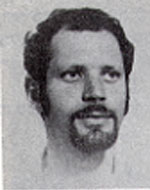Reuven, son of Joja (Zipora) and Avigdor, was born on March 2, 1946, in Afula, members of the Avuka group in the Beit She’n Valley. The agriculture suffered from social problems and three and a half years later it was decided to dissolve it. Reuven and his family joined Kibbutz Kfar Menachem. While he was little, Reuven discovered a talent for painting and plastic arts. Even before the art became his profession, he liked to paint and produced magnificent paintings and wonderful caricatures, in which his excellent sense of humor was revealed. From an early age, he adopted the little man, bursting with laughter, as a kind of stamp of his own image. When he grew up he began to engage with the same enthusiasm in handball and trumpet playing. After-school hours, he helped his father with the herd and also helped him prepare for the parties and holidays in the kibbutz, especially in the field of humor and caricature. he was very clops with his mother, and he would open his heart to her, knowing that she would always understand him. Reuven grew up and became a handsome, cheerful, and friendly young man. he was known as the “funny man” of the kibbutz, he could humorously end every event, including serious events. His colors and drawings glorified the kibbutz and his music amused everyone. As an athlete, he was a member of the Hapoel handball team in Kfar Menachem and later was the head of it. Reuven was drafted into the IDF in mid-November 1964. After completing his basic training, he completed the Sherman artillery course and the Sherman tank commanders’ course and received the last one with a high grade, before completing his regular service. During his service in the Israel Defense Forces, he painted caricatures in his free time, where one can discern the difficulties and the great effort that Reuven could present with a broad. After completing an officer’s course, he was sent to the Armored Corps course and was appointed to serve in the Armored Corps during the period of his service in the regular army, and in his letters from that time he expressed his confidence in victory, even though his soul was loath to war. When the Six Day War broke out, Reuven was sent to the front of Sinai and his tank destroyed three enemy tanks: Once, when a mortar shell landed on his tank, an oil keg that was attached to it was hit, For a moment it seemed to him that he had gone blind, but “damage inspection” revealed that it was only oil washing. Another time he survived when he noticed an Egyptian soldier climbing the tank at the very last minute, and killed him. at the end of August 1967. After returning to the kibbutz he was sent to Bezalel Academy of Art and Design in Jerusalem and after graduating he joined his father in the ceramics factory. Along with his great artistic talent, his ceramic designs express the connection between yesterday and tomorrow, his works are imaginative, their vivid colors and their decorations, taken from ancient motifs, fit well into the usability of the instrument, all of which are full of lightness and beauty. In 1971, Reuven met a girl named Eti, who came for a random visit to the farm. She stayed in the farm and the two married. The wedding invitations were designed by Reuven and he painted himself – tall and long-legged, carried by his collar by little Etty with braids. In the summer of 1972, Reuven was sent to a training period at the famous ceramics factory in Delft, Holland. His letters are filled with humor as usual, and caricatures, including one, in which the Israeli – Reuven – arrives at the port with the sign saying, “Snob, have you been in Eilat?” The Israeli applauds – “Yes!” When the couple returned from the Netherlands, Reuven also returned to his athletic activities, headed the farm’s handball team. When the Yom Kippur War broke out, Reuven was sick in bed, according to a doctor’s instructions, because of an injury to his throat during training in a handball game. He got out of bed and hurried to his unit on the Golan Heights. His tank was not in good condition, so he parted from the unit and led him to the workshop. On Wednesday, October 10, 1973, he was attached to two other tanks to serve as a cover for a mortar unit. In the past, the three tanks were hit by heavy anti-tank fire from the Syrians, and the crews abandoned them and took shelter behind the basalt walls, which were scattered in the field, and tried to reach a nearby stone structure. He was brought to eternal rest in the cemetery in Kfar Menahem and left behind a wife, parents, and brother, and Kibbutz Kfar Menachem held a handball tournament in memory of Reuven and published a booklet in his memory. Reuven the artist: “Even on difficult and serious situations, Reuven knew how to respond with jest, and to overcome them with a smile. Even in the most bitter and piercing arguments, he chose to speak gently and pleasantly. Reuven’s mind runs before the hands, and the hands do not stick to the ingenuity. He created things from nothing.
